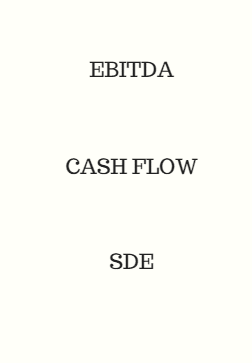Whether You’re Selling or Buying, Know Your Numbers – EBITDA, Cash Flow and SDE
If you’re thinking about selling or buying a business, you need to have a good grasp on EBITDA – earnings before interest, taxes, depreciation and amortization. It’s the standard used when valuing many larger businesses.
Buyers looking to acquire larger businesses (valued at $10 million and higher) need to consider normal management or CEO salaries as an ongoing expense, so an owner’s salary will not be included as a discretionary item. A typical salary for the position, taking into consideration the industry, size of company, market conditions and expectations of the CEO will dictate the salary level.
 For example, if the current owner is taking a salary that’s higher than what the new owner plans to pay, it will improve the EBITDA figures, increasing the value – and the apparent cash flow potential – of the business. Exceptionally large personal expenses for cars, boats or lake houses also may get added to EBITDA, which would have a positive impact on the business valuation.
For example, if the current owner is taking a salary that’s higher than what the new owner plans to pay, it will improve the EBITDA figures, increasing the value – and the apparent cash flow potential – of the business. Exceptionally large personal expenses for cars, boats or lake houses also may get added to EBITDA, which would have a positive impact on the business valuation.
However, forget getting credit for smaller expenses like phones, groceries, medical, insurance and personal legal or accounting bills. Fortunately, many owners of the larger businesses keep their books much cleaner and don’t run as many personal expenses through the business.
When we price a business, EBITDA is one measure we consider. But we prefer to also consider the Seller’s Discretionary Earnings (SDE). That includes the owner salary, plus other (reasonable and documented) seller benefits expensed to the business.
We add those on top of EBITDA for a more reasonable picture on which we can place a multiple and suggest a fair price. After all, the buyer will have the benefit of the cash flow of the business without all the current owner’s benefits.
We worked with a business recently that had $2 million in SDE. But the owner was taking a $400,000 salary and $200,000 in other benefits, which made EBITDA $1.4 million. We argued that $200,000 was a more reasonable owner/manager salary, and we could eliminate most of the “other benefits,” resulting in a more accurate earnings assessment of $1.8 million.
We find using the SDE more reasonably reflects the expected earnings for a buyer, gets the seller a more reasonable price and will also be allowed for bank financing.
Our advice is this: Whether you’re selling or buying, know your numbers – EBITDA, cash flow and SDE. But don’t let them intimidate you. Make sure you know what’s behind those numbers and how it will affect the potential costs and benefits of the business.
If you or someone you know is interested in buying or selling a business, please call us at 913-383-2671 or contact one of our Apex Business Advisors today!



